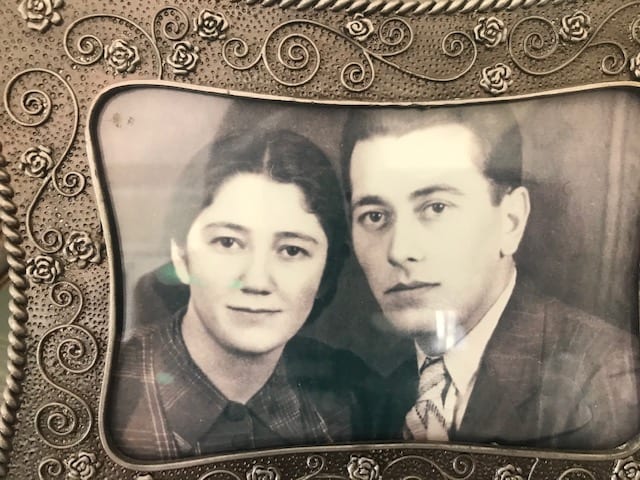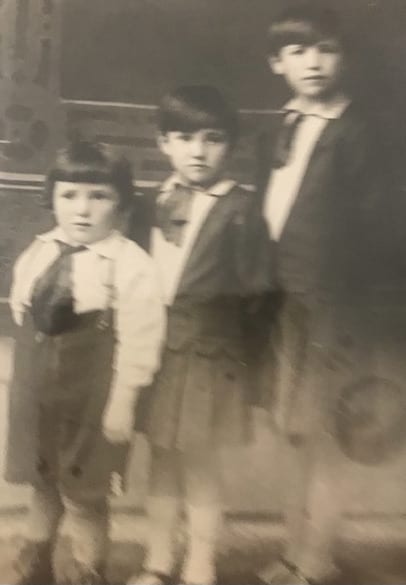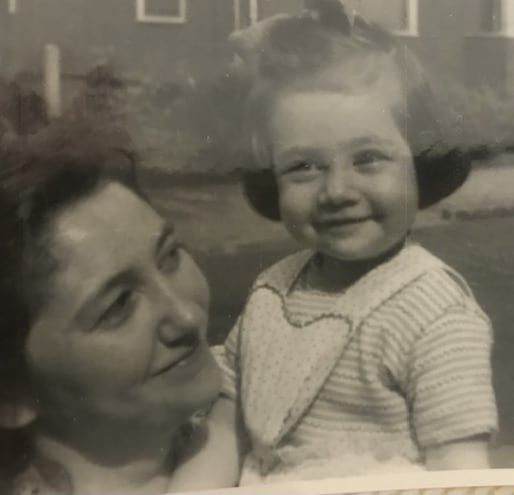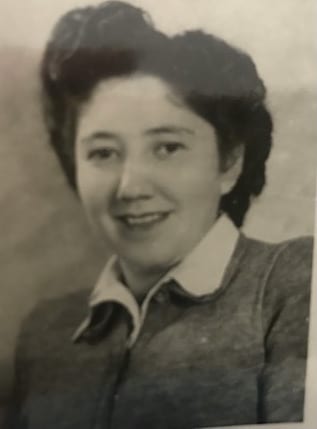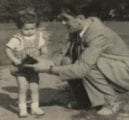- Local Survivor registry
- RUTH A. MARKIEWICZ
- Local Survivor registry
- RUTH A. MARKIEWICZ
Survivor Profile
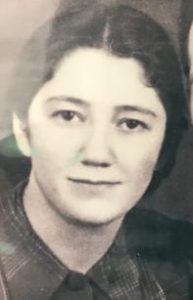
RUTH
A.
MARKIEWICZ
(1928 - 2022)
PRE-WAR NAME:
RYSIA ACKERMAN
RYSIA ACKERMAN
PLACE OF BIRTH:
SCHUMSK, POLAND
SCHUMSK, POLAND
DATE OF BIRTH:
FEBRUARY 28, 1928
FEBRUARY 28, 1928
LOCATION(s) BEFORE THE WAR:
SCHUMSK, POLAND
SCHUMSK, POLAND
LOCATION(s) DURING THE WAR:
SIBERIA
SIBERIA
STATUS:
CHILD SURVIVOR, REFUGEE
CHILD SURVIVOR, REFUGEE
RELATED PERSON(S):
JOSEPH MARKIEWICZ - Spouse (Deceased),
REGINA MARKIEWICZ YOSKOWITZ - Daughter,
MICHAEL MARKIEWICZ - Son
-
BIOGRAPHY BY REGINA YOSKOWITZ, DAUGHTER
BIOGRAPHY OF RUTH MARKIEWICZ BY REGINA YOSKOWITZ
My mother born Rysia grew up in a well-to-do, comfortable home in Schumsk, a small town in Poland surrounded by vegetable gardens and fruit trees. My mother remembers her childhood as “happy” and “loving.” She was a tomboy—free to explore her world, picking tomatoes from the garden and apples from the trees. Her parents, Leib and Freida Ackerman owned a dry goods store. My grandfather was head of the synagogue and always brought home guests for their shabbat dinner. Grandmother always baked extra food and challahs weekly which the children delivered to people in town that were not well off. My grandfather built an extra brick home next to his which he rented out in preparation for when one of his daughters married.
I have a lot of stories of my mother’s childhood to tell. Their home was warm and welcoming. Freida was an extraordinary cook. She made everything from scratch including homemade chocolates. They had a cow and fresh milk and butter every day. They were always very well dressed and had special clothes made for the children for holidays. They hired people to tend their gardens. They canned and preserved the food from the gardens and their trees to get through the harsh winters in Poland. Every year they would grind huge stores of wheat and bring it to the miller who baked it into matzos. Then they would pack them in straw baskets and store them covered with linens in the basement.
My mother always remembers they just got their matzas for Passover when the war broke out. In her town the Russians came marching on their horses. People in the streets were greeting them so warmly. My mother was 11 at the time and she didn’t understand why people were greeting them with flowers. The poor people thought that the communists would help them. Not my grandfather. First thing they did was to take away the keys to his store. My grandfather had no business. He turned gray overnight. How would he feed his children? Then they searched the house. The Russians took over the schools and began teaching Russian and how great Stalin was. There was a poem my mother was selected to recite in front of the town about how great Stalin was “Long Live Stalin.” She didn’t want to recite the poem but her father said she had to do it. My mother remembers her father right there supporting her.
A few weeks later they took my mother’s father away and she never saw him again. The Russians came in the middle of the night banging on the door. They always come in the middle of the night. They told him to get dressed and come with them. My grandmother fainted. Everyone was crying. They gave him a half hour to say goodbye while the soldiers waited outside. They never knew what happened to him.
I just found out a few months ago, after years of searching, what actually happened to my grandfather, Leib. I have the historic report that he was found guilty of “provocation” and sentenced to eight years in a hard labor camp in Siberia. My mother was applying recently for a Polish pension (Poland just provided this opportunity) and a helpful volunteer found the document from the labor camp. When I received the information about what had happened to my grandfather, I sent it to my brother, my children, and my cousins. We were all shocked and amazed. It meant closure for us just knowing what happened. Did he survive after that? Did he try to find his family? We don’t know anymore. I asked the volunteer if he could find out more information and he said he could not.
A few months later, Russian soldiers pounded on the door in the middle of the night once again. They put a watch on the table and told my grandmother to dress the children warm and “you have a half hour to leave.” They told my grandmother they could take anything they wanted but my grandmother fainted again. They were four little children ages 13 to seven standing there. They had no time to dress warm. They left with the clothes on their backs and a coat. Since it was spring, the Russians put them on a horse drawn carriage. It was very damp and wet and the carriage toppled. My grandmother fainted again when that happened. A few neighbors sneaked out and gave them a loaf of bread and a little sugar. They subsisted on that bread and sugar for a few weeks because that was how long they were travelling.
The Russians took them to a freight train that was waiting (perhaps in Schumsk). There was one tiny window in the train and it was very crowded. They travelled on that train for weeks. They would make stops in the middle of night and the train would stop in the middle of the night. The Russians would bring in a pail of soup for everyone to share. Once, when the train stopped, my mother looked out the tiny window and remembers seeing people outside begging for food. My mother, 11 at the time, watched the people begging for food and said, “We’re in trouble if they’re asking us for food.” Everyone was starving. Weeks later the Russians dropped them off in Shedrinka, a little village. They were told they had to stay there for five years, not leave and they would be watched.
Fortunately, my grandmother spoke perfect Russian. She went from hut to hut asking people for shelter and food. The huts were made from mud and straw. My grandmother and her and four children slept in huts and in barns, wherever they could find shelter, sometimes with animals. My grandmother had rheumatic heart disease (this was later diagnosed in America). That is why she kept fainting. They had to survive with nothing. Barely clothes. There was no food. She wrote a letter to the Rabbi back in Schumsk and he said “Eat anything you can to survive. Don’t worry if it’s not kosher.” My mother said they had a hard time eating pig. People were arrested all the time for saying the wrong thing. The little kids learned not to speak.
My mother and her older sister, Chana, were put to work chopping ice off the train tracks so the trains could get through. One day as my mother was chopping ice, a train actually hit my mother and carried her some distance. She woke up lying on the snow. She didn’t know where she was. And out of nowhere came a man with a donkey and sled and lifted her onto that sled and took her to a hospital. He never said a word to her. She calls him her angel. She never saw him again. She has so many angels that helped her survive. By then she was about 14. She still has had back problems from that horrific accident. In the little hospital there was one doctor, a woman. The doctor in the hospital was Jewish. She took special care of my mother. They put her in hot baths and soaked her. They warmed her to dissolved blood clots. They had no medicine or supplies in the hospital.
My grandmother did not know where my mother was. My grandmother walked for miles to find my mother. Weeks later she found her in that tiny hospital walking on crutches. The doctor said it was a miracle she was walking at all. Eventually, my mother recovered and they tried to send her to the army. The commander in the town said “If she can’t work on the trains, I’m sending her to the army.” She was still on crutches. He said “next week she leaves.” My grandmother went to the man’s commanding officer. He said, “If she’s 15 she should be in school.” My grandmother said, “When it comes to my children, I will do anything I have to do.”
As the five years was almost over, it became time for Ruth’s family to leave Shedrinka. They next went to the neighboring town of Sohotim. My grandmother met a woman there near the train station who took them into her one room, but there were already 15 people there. The people there taught my mother and her brother how to trade on the black market, salt from the passengers on the trains, for eggs from my mother and brother. Salt was a valuable commodity at the time for its medicinal purposes. The black market was dangerous with anti-Semitic people beating those trading.
When the war ended, Polish citizens were allowed to return to Poland. Ruth’s family boarded a train and arrived in a town called Belava. They met a cousin who told them not to go back to try to claim their family home. Everyone was killing Jews. They didn’t know what to do. Poles greeted them by saying “We thought Hitler killed you all.” So, they did not go back to their home in Schumsk.
Various kibbutz movements in Belava were organizing Jews to go to Palestine. The only one that would accept my grandmother because of her age and condition was Shomer Hatzair. It was a left- leaning communist kibbutz movement, but they didn’t know it at the time and this would later cause problems for Ruth trying to emigrate to the United States. The kibbutz movement fed, clothed and sheltered the family in Belava and then they went to Czechoslavkia by climbing the mountains. The family then spent two nights in Prague and then marched to Austria to the DP camps in Linz, Austria. Then they spent five years in different DP camps because my grandmother couldn’t make the trip to Palestine. Most of the people in the camps were young. They were the ones that went to Palestine.
My parents met in one of the camps. My father, Joseph Markiewicz, fell in love with my mother the moment he saw her. He was the sole survivor of his family and he attached himself to her family and didn’t leave her. She was 17 and he was 22. I was born May 23, 1951 in a hospital in Linz which I went to visit in 2016. I was the first-born child of my parents. My grandmother, my uncle and two aunts all left the DP camps between 1950-51 for Lynn, Massachusetts. My mother was detained because she was accused of being a communist. The reason was because she was part of the Kibbutz movement of Shomer Hatzair. (So was the rest of the family, but the authorities let them go).
An American commander would not approve her emigration and kept interrogating her. After so many interrogations, my mother finally said she wanted to ask him a question. This was usually not permitted. “I want to know what you would have done in my place? Would you have left your sick mother after all that she had been through?” He looked at her and stamped her papers. That’s how we, my mother, Ruth, my father, Joseph and myself, finally got approved to leave. We were close to going to Canada when the American papers came through.
Editor’s Note
Ruth passed after a long illness on March 6, 2022 at the age of 94.
Refer to Historical Notes Below for the History of Shumsk
-
SURVIVOR INTERVIEW:
Refer to Biography Above by Regina Yoskowitz , daughter
-
HISTORICAL NOTES:
History of Shumsk
The town of Shumsk is located at 50’07’/26’07’, 62 km south of Rovno. It is called Shumsk in Yiddish, Ukrainian, and Polish, and Shumskoye in Russian. The Polish spelling Szumsk is sometimes used to this day. It is now part of the Ternopil Oblast (province) of Ukraine, but is identified with the historic region of Volhynia. It was part of Poland from the 16th century to the end of the 18th century, when it became part of Russia. In 1921 the Treaty of Riga returned Shumsk to Poland. It became part of the USSR in 1939, but was overtaken by the German Army during World War II. In 1945 Shumsk was again part of the USSR, and remained so until the establishment of the independent state of Ukraine in 1991.
The All Russian Census of 1897 listed the population of Shumsk as 2,258, 1,962 of whom (87%) were Jews. Most of the other residents were Polish, Russian, and Ukrainian, with a large number of Ukrainians and some Poles living in the nearby villages. There was significant emigration from the town in the first several decades of the 20th century, primarily to the United States. In the interwar period, a number of Shumsk Jews active in the Zionist movement emigrated to British Mandate Palestine. Almost all of the Jews who remained in the town were murdered by the Nazis and their sympathizers. The few who survived were either hidden by righteous gentiles (primarily Shtundists), or fled eastward into the Soviet Union ahead of the Germans. A handful attempted to resume their lives in the town following the War. Today the town is populated almost entirely by ethnic Ukrainians.
-
Sources and Credits:
Credits:
Biography of Ruth A. Markiewicz by Regina Yoskowitz, daughter; Digital historic and family photographs donated by Regina Yoskowitz.


